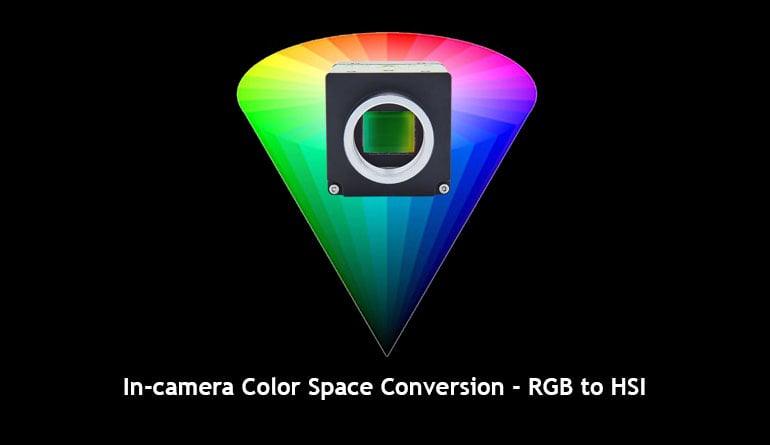
Modern image processing demands that challenging and complex inspection tasks are carried out successfully without compromising on speed and other basic functioning of the camera device. For color applications, RGB imaging has been the state of the art in camera sensor technology for many decades.
Over the years, image sensors have continuously improved on physical parameters such as linearity, sensitivity, quantum efficiency, and noise. These improvements have helped to improve the overall image quality in an RGB color space. The resulting mixtures in this RGB color space can now reproduce a wide variety of colors (color gamut), which has continued to improve over the last several years.
In machine vision applications, RGB images work perfectly fine for applications which do not require the intuitional advantages of human vision, but instead need the best possible description of color. However, neither additive nor subtractive color models define color relationships in the same way a human does. This is where color conversion from RGB to other color models comes into play.
Designed in the 1970´s, the HSI (Hue, Saturation and Intensity) model is an alternative representation of the RGB color model. It was originally designed by computer graphic researchers to align with the way human vision perceives color and its attributes. In the HSI model, the intensity is decoupled from the color information in the image, and both hue and saturation are closely related to the way in which humans observe color. It is an ideal tool for developing image-processing algorithms that are related to the human visual system.
The HSI color model gives the best performance in terms of true-color image processing. This model is more efficient to carry out further image processing operations such as color image enhancement, feature based image segmentation, image fusion, color-based object detection, image recognition, traffic signal interpretation, and skin color detection. In addition, it also avoids the out-of-gamut problems of the RGB space by transforming the RGB colors to an intuitive three dimensional color model.
It is important to note that HSI is a simple transformation of RGB which preserves the symmetries in an RGB cube, unrelated to human perception. HSI works well for most of the fast image processing applications. However, it ignores the complexity of color appearance. This color model trades-off between computational speed and perceptual complexities. In addition, because the HSI color space is a linear conversion from an RGB space, it is not an absolute color space. The HSI model inherits all the characteristics of its original RGB color space including the gamma correction.
From the perspective of pixel format of HSI colors for data flow from the camera to other devices in the machine vision system, the GenICam Pixel Format Naming Convention (PFNC) standardizes a generic convention to define RGB and non-RGB information such as HSI. This guideline helps to deal with non-conventional pixel formats and their numerical values.
The pixel formats for HSI were added to this standard in 2011. Hue is defined from 0° - 360° whereas saturation and intensity are defined from 0% - 100%. The representation of saturation and intensity is straightforward, but as 8-bit can only represent 0 to 255 values, the value of Hue (360) cannot be expressed. Therefore, half the value is taken in 8-bit, which is doubled in a 10-bit representation and octupled in 12-bit. The same logic can be implemented for color space conversion from RGB to CIEXYZ, CIELAB, RG to YCbCr and so on.
More information:
The table below give an overview of cameras with Color Space Conversion functions.
| Apex Series (3-CMOS Area Scan) |
Spark Series (1-CMOS Area Scan) |
Sweep Series (3-CMOS Line Scan) |
Sweep+ Series (CMOS Trilinear) |
| All Apex cameras. See list here. | SP-12401C-PGE SP-12401C-USB |
SW-4000T-10GE SW-4000T-SFP SW-4000T-MCL |
SW-4000TL-10GE SW-4000TL-SFP SW-4000TL- PMCL |
Questions?
JAI offers machine vision cameras for both area scan and line scan applications that support in-camera RGB to HSI color space conversion. For questions about these cameras and the color space conversion process, please contact JAI.

